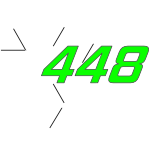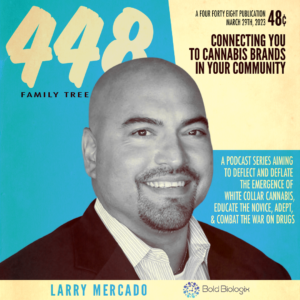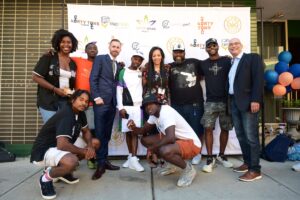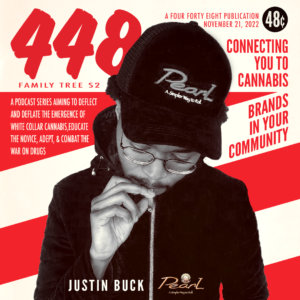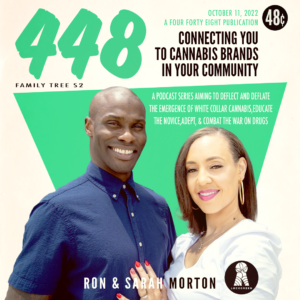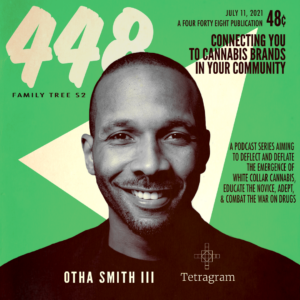Family Tree S2: Tetragram
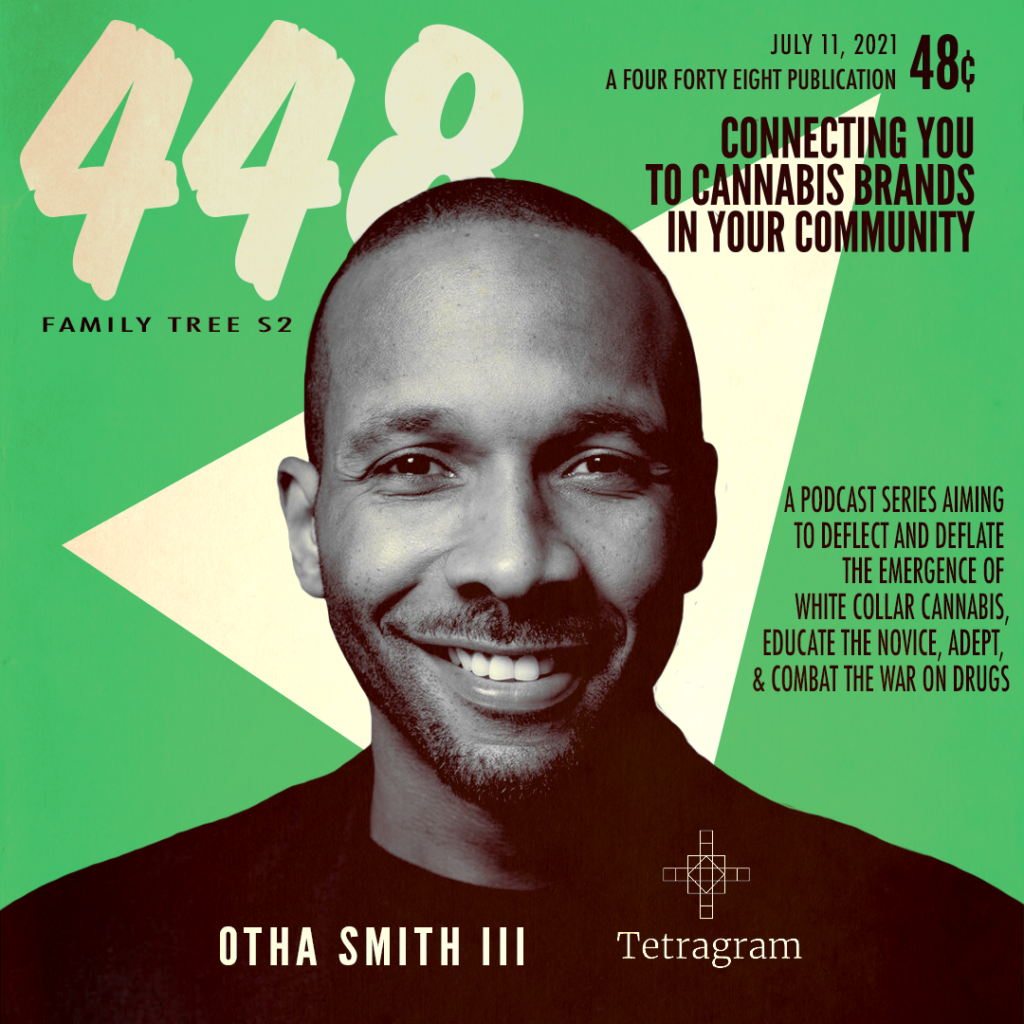

448: Yo. What’s going on bro?
Otha: What’s happening man?
448: Hey man. Not too much. Not too much.
Otha: Just got finished cutting the grass.
All: (Laughs)
448: I need to do that soon. We’ve been getting a lot of rain down here.
But this is my Boy Raz. Raz is the co-host for the interview series. What’s going on everybody (In the audience)? We got a special guest here. My brother Otha Smith, the 3rd. Can’t leave that off.
Otha: (Laughs) 100%.
448: Founder, CEO of Tetragram. How are you, my brother?
Otha: Doing well, man. How are you?
448: Word. Word. I’m good, man! So we’re just gonna get right into it. So Otha is the CEO of Tetragram, which is an app that you can download and track different cannabis products that you’re consuming.
You have the ability to document the terpene profile, cannabinoids, as well as the effects (of these products).
Q: So how did you get started with Tetragram?
Otha: Uh, just really outta my own personal need, man. I was involved in a pretty tragic car accident in 2006. I was on prescription pills for a number of years (as a result) and, definitely didn’t wanna live that life.
We all know how dangerous prescription pills can be, you know? I’ve always been a holistic person. I could count on like one hand how many times I’ve used a pill for anything prior to getting into that accident. Always being a fan of cannabis. Ever since high school. I mean, I think I started smoking when I was like 15 years old. (Laughs)
The town that I grew up in was notorious for growing cannabis, and so I was always a fan. And then, you know, in order to get off of opioids, I just started to put all my faith back into the plant. And here we are today, man. So, you know, as the cannabis industry has started to become legal, there’s just so much that we don’t know.
I mean, me being someone that started smoking when I was 15, I walked into a dispensary; terpenes, and cannabinoid. I’d never heard of this stuff.
448: Yeah! (Laughs).
Otha: Like if I’m having this experience with cannabis and I’ve been using it for this long, I could only imagine people who haven’t used it a day in their life or you know, not in 20+ years.
448: Definitely, definitely.
Q: So you talked about being a patient yourself and being prescribed these opioids and knowing that wasn’t the way that you wanted to live for the rest of your life. Talk about that. Did you get a medical card? Did you self prescribe? How did your journey on the medical side start after being a user for as many years as you were?
Otha: Yeah, so when Maryland opened up their program here I just jumped at the opportunity. You know, when Colorado was the first state to legalize it recreationally, I flew out there way back in the early days and was like, Wow, there’s a lot to this industry and I want to be in it some way somehow.
And then I came back home (MD) and patiently waited until they approved cannabis medically here. And luckily for me, there was a dispensary five minutes from my house. So it doesn’t get any more convenient than that. I went in there and talked to a nurse and the nurse told her my history with my car accident, the chronic back pain and so forth that I experienced.
And she certified me. And then I had to wait to get certified by the state, get my patient ID card, and that took about a month. Once that happened, I circled right back around and went back to that dispensary. So it was an eye opening experience just to see so many products. When your legacy dealer has products, he’s just like, “I got two kinds,man.” “I got the Reggie and I got some fire over here. So what do you want?”
Then to go into a dispensary and be like a kid in a candy shop is, it’s a moment I’ll never forget.
448: Word! That’s what’s up, man. Yeah, a lot of people are on the opioids man. It’s a big issue in our country right now. It’s an opioid epidemic rather..
Q: So you get a medical card, you start self prescribing, just taking different products that you’re getting at the dispensary that the budtender recommended. Were you documenting what you were using? Is that how you it all started with Tetragram?
Otha: Yeah, pretty much. When I first got approved, went into the dispensary, then I started just going to all these other dispensaries and people were just making recommendations and I was just like, I didn’t feel confident in ’em, you know, I was just like, does this person really knows what they’re talking about.
They’re just trying to sell me something that’s got a good price, a good margin for them. So uh, one of the things that was always notorious, especially being in Maryland where it’s a medical market, is that no matter who I talked to, whether it was a clinical physician, which every dispensary here in Maryland has to have on staff, or talking to a budtender or whoever, everyone just kept recommending using your journal.
And I saw people and some dispensaries are actually selling these journals and people were buying them left and right. And I was like, well, everything we do is on our phone these days, so I got a better idea. Why don’t we just create an app so that people can do it a lot easier. And so that really was the birthplace of Tetragram.
Just going through a sea of products, not knowing what’s gonna work for me, cannabis affects everyone differently. And so in order for me to find, not even that right product, but that right terpene, that right cannabinoid and that right consumption method, I knew there was no way I was gonna do so unless I input it, wrote it down or something.
So that’s what led to the birthplace of teragram. Then we went to work. I spent two years finding my now business partners. So we built the application, our beta version, and just took off from there. I’ll say honestly, I never expected that beta version to do as well as it did.
But, this shows the need that people have in this industry as consumers to say, I want to try cannabis. I know there’s some benefit there, but I can’t rely on anybody so I gotta find a more efficient way to document all this stuff.
448: Dope. Dope.
Q: So you created the app, what was it like getting it into the hands of consumers?
Otha: Well, that was the fun part. You know, I’m sales through and through. I’ve started other companies in the past, so engaging with customers is easy to me. Second nature. So, once we built the app, went through the cumbersome process of getting it on the app store, getting it on Google Play store, once we got over that hurdle and we were ready to release. I just got all the marketing materials, so flyers, t-shirts, hats and stuff like that.
And so we just started going around to each dispensary in the state of Maryland at first, and just making the budtenders, making management aware of this tool, and then started doing like pop-up events, right? We do these popup events and we’ll be like, “Hey, this is Tetragram. This is what we’re about.”
The budtenders tell people at checkout if you download the app, we’ll give you some free swag. And that’s how we really created a buzz. And then we just started doing that and replicating that model across the country going from dispensary to dispensary, creating those relationships. Then also with certified physicians.
So the people that actually certify people to use cannabis, they were the ones who were also very actively talking about, “You gotta write it down. That’s the only way you’re going to keep track of this stuff.” And so if anybody listens to anybody in this world, they listen to their doctor, right? Or their nurse.
So if they tell you to do something, chances are you’re probably going to do it. So we knew that we needed to create inroads with the physicians, so that they could start promoting Teragram as well. And that created a lot of sticky.
448: That’s dope. That’s dope!
Q: So we know that Tetragram is promoted in several dispensaries throughout the country.
What is that like? What is the experience that the client’s gonna get in the dispensary with the app?
Otha: We’ve crossed over into 150 dispensary locations in a year and a half, so
448 (Raz): Wow.
Otha:Yeah.
448 (Raz): That’s awesome.
Otha: Yeah, man, it really spread like wildfire. And so we had relationships with some of the largest dispensaries in the country, such as: Curaleaf, GTI (Green Thumb Industries), and Vario Health which was recently acquired by Verano.
Then we have the small mom and pops and shops, ones that have like two or three locations. So it’s a mixed bag. At the bare minimum every dispensary partner that works with us and promotes Tetragram, you walk into their store and they’re gonna have like Tetragram flyers or marketing materials so that you can grab. Some of the dispensaries go as far as to putting it in every customer’s bag that’s a new patient.
In Curaleaf stores we actually have a 30 second commercial that airs inside some of their dispensaries. It tells people in summary, “Hey, I’ve had the same trouble as you trying to keep track of all this. Download Tetragram today.” We’re on social media, if you look at Curaleaf’s Instagram, or if you look at GTI’s Instagram, you’ll see that there’s no other company that they promote on their social platform.
And we’ve been fortunate enough to be that company because it’s all about providing a tool that just helps not only the consumer but the industry.
448: Mm-hmm. Absolutely. Absolutely
448 (Raz): Um, I had a question for you.
Q: For the people that are maybe just gaining wind of the app via your interviews, or walking into the dispensary and seeing the ads. Does it feel like it’s an app that’s more geared for specifically medical patients or is it a space for people that are recreational users?
448 (Raz): Cause when I look at cannabis as a whole and how it’s coming into the industry, it’s kind of separated I feel between medical and recreational.
Otha: No, it is actually geared for both. I mean, we’re definitely more medically focused. Uh, I always go as far as to say that, whether you like it or not, in my eyes, if you consume cannabis, you’re a patient, because you’re medicating. You hear cats talk about, “Oh man, I just got medicated.” Alright. Well, you’re a patient.
448 (Raz): (Laughs) I like that. That’s a good way to put it.
Otha: Yeah they ain’t trying to hear that, but, when I look at the data on the back end, that’s completely anonymous. Our platform is completely HIPAA compliant, so we don’t know who’s putting in that information, we just pull it out.
But we do have a lot of people who have logged their experiences into Tetragram and they have not selected a medical condition. So if they want to be called a recreational customer, then that’s the box we put ’em in. But as a recreational customer, if you want to consider yourself that, you’re trying a bunch of products too, and you want to remember the ones that you thought were really fire. It’s still going to address that need. You know,
448 (Raz): It’s not just gas anymore. It’s got a name now.
Otha: Yeah, yeah, exactly. Gas? Well what was it? Oh, it was, uh, white runtz! Oh, ok.
448: Word. That’s super dope. Um, so everybody can go download the app on the Apple Store and the Google Play store.
Otha: Exactly, exactly. You can also go to our website at tetragramapp.com and you can be directed to download it there as well.
Right now we’re working on version two and one of the things I always stress about even in our current version is, cannabis is the most communal plant in this world, right? Where people are always sharing their experiences. Prior to Covid people were like, “Yo, you want to hit this?” but that’s not happening too much.You gotta bring your own.
448: Well, we’re going to end it on that note, to catch the rest of the interview you guys gotta stay tuned.
